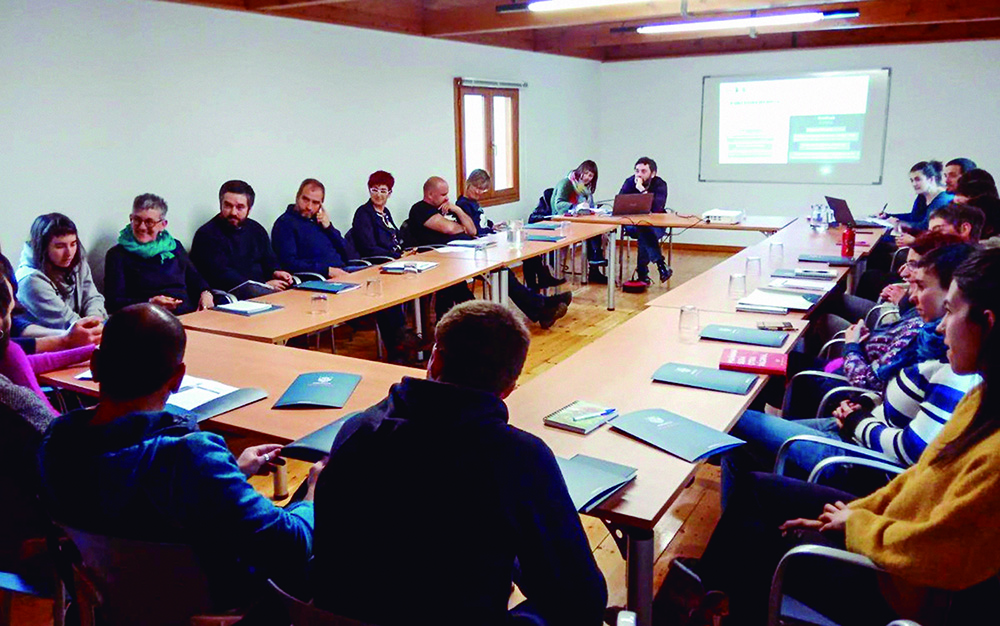José Antonio Guillén Gracia: "The loss of population is a symptom of an illness"
- Behind the depopulation there are, above all, economic factors; among others, José Antonio Guillén Gracia considers that there is a lack of a strategy to guide existing investments. Actors from Spain, Croatia and Greece, as well as several business associations, have set up a pressure group to boost state policies.

José Antonio Guillén Gracia, representative of the Network of Poor Areas of Southern Europe, has approached Campezo from Teruel. Guillén presented at the meetings organized by the Association of Councils of Álava on depopulation and rural development the successful strategy to deal with the problem in the High Territories of Scotland. In this regard, he stressed that in the Spanish State "clear policies are lacking" and that depopulation has its origin in "economic imbalances".
What is the European Network of Low Population Areas of the South? How did it come about?
The network consists of business associations from Soria, Cuenca and Teruel, operational groups from these countries and Lika-Senj County in Croatia and the country of Euritania in Greece. In the South of Europe we are territories of less than 12.5 inhabitants per square meter, which is what is considered as areas of low population according to European and Spanish regulations. We started working together in 2008 and it was our intention to organise a lobby in Europe.
What needs do you share? Why have you decided to join?
We met because the demographic loss that was taking place in our territories was very great. We believe that the loss of population we are experiencing is a symptom of a greater disease, a lack of economic, social and other vitality. Our possibilities are very limited, we are small entrepreneurs, very small territory and when we started the journey we did not know very well what we needed, what we had to ask for.
Where did you start?
We want to change policies. From the outset we have understood that the fight against depopulation or the fight against economic imbalance in Spain is not so much a question of money, but a problem of investment, a problem of investing well. If they are funds for economic cohesion, the fight against depopulation or the promotion of entrepreneurship, there is a lot of money, but the problem is that there is no clear strategy, that there are no clear policies to really combat depopulation. From the outset we have called for a change of mindset.
"We call for a change of mindset"
You have taken the model of the Scottish territorial development agency Highlands and Islands Enterprise (HIE) very seriously into account. What is your model based on?
In Scotland we have seen that they have different approaches and that they have achieved very good results. On the one hand, they have a fixed strategy, which is not changed every four years, coinciding with the change of government. There too, the loss of population comes from far away. They had lost 50 years of population, so the problem is structural and, therefore, basic, structural measures had to be taken. On the other hand, all the measures put in place have had the same objective: to change the economic model of this territory. They say: "We can't have a 21st-century economy that looks like the 19th century." And they have taken steps to deal with, for example, the digitisation of territory, not so much of people as of territory. It is curious, but statistics indicate that Spain is one of the European countries with better access to the Internet, if you take into account the population, not the territory. We have 95% of the population connected and the remaining 5% are not, which are always the same.
What are the basic lines of the Scottish strategy?
Quality housing at a reasonable price, digitalisation and work. The economy must be diversified, rural development and agricultural development cannot continue to be synonymous, agriculture has limited scope for development and added value. We need a different economy, based on new technologies and able to attract the new population, an economy that promotes other activities, based on training, that offers alternatives to attract young people.
Who should manage this process?
In Scotland, an agency has been set up, an autonomous agency. What it does is very interesting to follow up all the laws passed by the Scottish and British parliaments; and if there are measures affecting the rural environment and the territorial organisation, they challenge the parties. They have a great reputation and are asked to give their opinion on a number of issues.
Can such a model be used in the Spanish State?
No. We were there two years ago and we tried to spread what we learned. It would be a matter for the administrations to implement it, because it is a model that has been very successful. The Highlands of Scotland have gained 22% of the population since the agency was launched. In Spain, for example, we have lost 36% of the population in that period.
"The dismantling of rural areas is bad for the country"
Is the problem so serious?
Yes. I think so. It is true that, on many occasions, the media has taken things out of context: They've given headlines like "South Lapland," and they've referred to realities that have nothing to do with our case, because Scandinavia has never been humanized, it's a natural territory, and it has never had more population than it is now. In our case, in the field, the human being has always been present, and now that factor is disappearing. What is the future of that 50% or 60% of the territory if the human being disappears from it? What will happen to our territory? What will happen in cities? What will they eat? What are you going to drink? Energy is created in the field, I don't see the solar panels in Madrid. The dismantling of the rural environment is bad for the country.
Is territorial balance also a matter of justice?
Quite clearly. You cannot impose on one part of the population the same obligations as others and at the same time without rights or with fewer rights. Development opportunities are also needed in rural areas.
What steps must be taken to reverse the situation?
We are hopeful of the strategy against depopulation initiated by the former pp government and followed by the current PSOE government. Because this is the first time that the problem has been recognised and action is taken. The Basque Autonomous Community has a very high level of development, but it also has uninhabited territories, so it also faces the problem. The problem is that of everyone, what is happening in Aragon or in Castile can be repeated here.
And what role do the inhabitants of rural areas play in this?
The inhabitants of rural areas must be aware that we are the agents of change. Politicians, administrations have to do their part, but if we do not push it forward and do not change the message we have about rural areas, we are not going anywhere. We have to regain the pride of the dwarf. Twenty-five or fifty years from now, I don't know when, it will be wanted by anyone who doesn't have a village.
What challenges do you have?
We have worked on a number of reports along different lines. The last one concerns taxation. This suggests that if incentives are not created to attract people and businesses to rural areas, it is very difficult to reverse the demographic situation. In addition, it would be a legal measure, which would be cheaper than is believed. We will also present next year a report on the ecological impact of depopulation in Europe, to indicate that investing in depopulation is investing in the fight against climate change. We also want a match in Brussels, so that the party that is invested in northern Europe against depopulation is also installed in southern Europe.
Rustic
The number of people living in rural areas in the Basque Country and the number of people engaged in agriculture and livestock farming is declining dramatically. In the Basque Country, only 12% of the population lives in rural areas (compared to 26% of the European average); the primary sector, in terms of GDP, is less than 1% in the CAPV and only 8.5% of the holders of agricultural holdings are people under 35 years of age; in the last three decades one third of the farms have been lost and the average income in the rural environment is 30%.
2014 eta 2020 urteen artean 350 biztanle galdu ditu Zuberoak (-%2.55). Galera handienak Maule, Barkoxe, Sohüta, Garindaine, Ligi, Mitikile, Atharratze, Bildoze, Altzai eta Montori herrietan izan dira. Haatik, zenbait herritan biztanle kopurua emeki goratzen ari da.
Azken biztanle kontaketaren arabera, Lapurdiko kostaldeko herri bakarra da Ziburu beheranzko joeran dagoena. 6.800 izatetik 6.200 biztanle izatera pasa da azken sei urteotan.
Hurrengo urtean India izango da munduko herrialderik populatuena, Txinaren aurretik; datorren azarorako, 8.000 milioi herritar izango ditu planetak; zortzi herrialdetan kontzentratuko da biztanleriaren hazkunderik handiena; baina oro har jaiotze tasa txikitzen eta biztanleria... [+]
From time to time, I hear or read a concern that normally goes through the edge of my attention: the population ages. It's happened to me recently. And through a plunge of data, I'm usually unearthed by the pace and geography of that aging. It tempts us to be serious and to... [+]
Herri eta bailara ugari basamortu bihurtzen ari da Euskal Herrian. Lan eta zerbitzurik gabe, egungo merkatuak bazterturiko eremuotan nola bizi? Egoera hori irauli nahi du Udalbiltzak, eta horretarako, logika lehiakorretik at, pertsonak erdigunean jartzen dituen ekonomia... [+]























